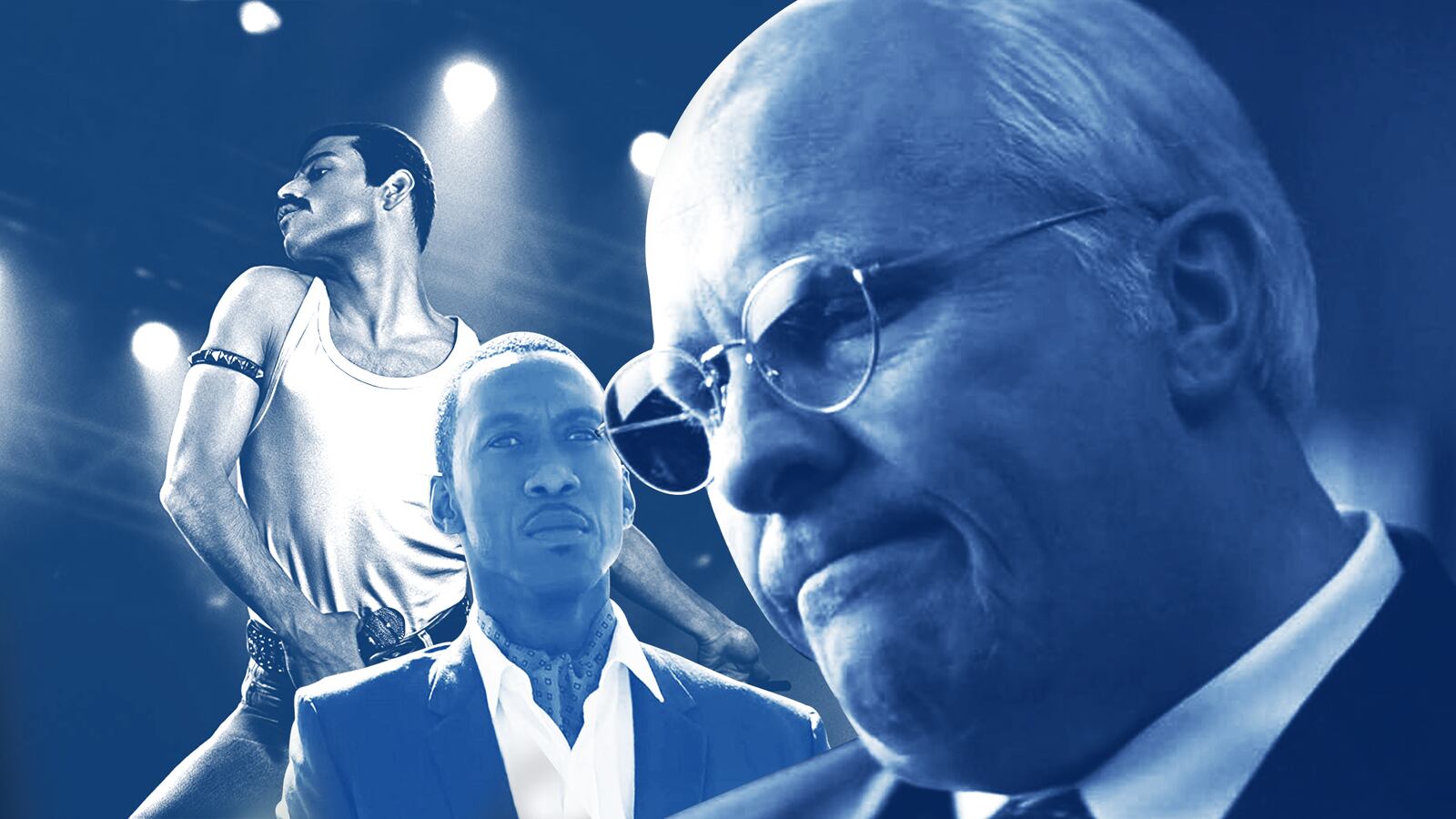At this point, we’re used to there being watershed moments in the Best Picture race at the Oscars. That’s the case again this year. Black Panther becomes the first superhero movie to ever be nominated in the category. How great! Roma is the first Netflix movie to score the top nomination. The future! Bohemian Rhapsody and Vice are the worst-reviewed Best Picture nominees of the modern era. How...ridiculous.
There’s been so much talk this year—this past decade, really—about whether Academy voters are out of step with audiences, a constant anxiety that led to the expansion of the Best Picture category in 2010 and, this year, the controversial suggestion of a separate Best Popular Film category. That proved wholly unnecessary, with A Star Is Born, Bohemian Rhapsody, and Black Panther making up three of the eight Best Picture nominees and each earning bona fide blockbuster status in their own right.
No, the real dissonance, as this year’s Oscar nominees make clear, is between Oscar voters and critics. It’s not whether voters care if their movies have been seen by the general public that is the big question anymore. It’s whether they care if their movies are good.
Rotten Tomatoes is not a perfect metric, but it’s the metric we have to measure this. On the review aggregator site, Bohemian Rhapsody scored a bleak 62, while Vice came in at 64. That is alarmingly low for a Best Picture nominee, with only two other years in the modern era nominating films that scored lower than 70.
(We are ruling the “modern era” as the 2010 ceremony and beyond, as that is the first year the Academy expanded the Best Picture category past five nominees and is about as far back as we can go reliably in terms of Rotten Tomatoes scores as a rubric.)
They are the worst-reviewed nominees since American Sniper, which scored a 72 in 2015. In 2013, Les Miserables was nominated with just a 69 on Rotten Tomatoes. The only movie to earn worse reviews than Vice and Bohemian Rhapsody is 2012’s Extremely Loud and Incredibly Close, which bottomed out at 46.
What’s notable about this year is that it is the first time that there are two nominees to score this low; no other year in the time frame had two fall below 75. Add Green Book’s less-than-stellar 82 score, and this could be considered, on average, the worst reviewed crop of Best Picture nominees in modern times. (Since 2010, only six other films had scored lower than Green Book.)
Yes, throughout the Academy’s history there have been Best Picture nominees that are far more terrible and hated by critics than this trio. (From 1936’s Anthony Adverse to 1952’s The Greatest Show on Earth, you can see the list of the worst-reviewed Best Picture nominees ever here.)
But over the last decade, the Academy has been defined by the ways in which it has altered rules and reformed its membership in order to better reflect what it means to be a “Best Picture,” in ways pointedly meant to nominate more diverse and, in reaction to a relentless criticism of the Oscars, more mainstream films. While there are arguments to be made about whether the organization has succeeded on those counts, this year especially surfaces perhaps an unintended consequence of all these changes: What if it means nominating more films that just aren’t very good? Doesn’t that, by definition, tarnish the integrity of calling something “Best”?
It goes without saying that the Academy has throughout its history failed to recognize films critics loved at the expense of ones they were lukewarm on. The occasion of BlacKkKlansman’s Best Picture nomination is a reminder of when Spike Lee’s Do the Right Thing wasn’t even nominated in year that Driving Miss Daisy won. And that’s just one of dozens of examples that movie fans have trigger-ready to give any time the Academy’s legitimacy is called into question.
But in a year when two movies as ruthlessly—and deservedly—lambasted by critics as Vice and Bohemian Rhapsody are nominated, and when Green Book, with its incessant headlines over how problematic it is, has emerged as the Best Picture frontrunner, it’s worth wondering how big of a problem this has become.
Take into account, for example, the fact that no women were nominated for Best Director once again, no women received a solo best screenplay nomination, and none of the Best Picture nominees were directed by women. And in a year remarkable for its great films directed by women.
The Rider (97 score on Rotten Tomatoes), Can You Ever Forgive Me? (98), Private Life (94), Leave No Trace (100), and You Were Never Really Here (89) were all directed by women, written or co-written by women, and aggressively championed by critics. Yet none of those women were nominated for Best Director, with room apparently needing to be made for Vice’s Adam McKay. And none of those movies were nominated for Best Picture, despite their rapturous reviews.
That the industry is still in a state where the accomplishments of female filmmakers are being institutionally dismissed, and the fact that critics’ voices are mattering less does raise an alarm for the future of representation in the industry.
It’s easy to read this from a critic and scoff. But the fact is that the Oscars matter. They give opportunity to filmmakers. They signal what’s worthy to viewers. They telegraph what constitutes excellent, responsible film making. They offer a referendum on the cultural moment at the time. They make people feel seen.
That the Best Picture race is moving in a direction where an anodyne race dramedy, an insult to Freddie Mercury’s legacy and the AIDS crisis, and a trolling of modern American history are deemed superior to, I don’t know, If Beale Street Could Talk or Can You Ever Forgive Me? is the kind of cultural evolution worthy of a warning siren.
At the very least, hey, it’s extremely annoying.







